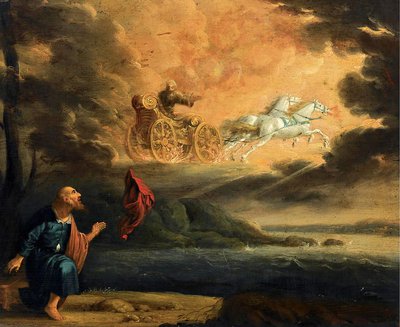Thoughts for the Day
Wednesday, 19th June 2024: Elijah 8 - The succession
Elisha Elijah Vocation Prophet Calling 2 Kings 2
Reading : Verses from 2 Kings, Chapter 2

Now when the Lord was about to take Elijah up to heaven by a whirlwind, Elijah and Elisha were on their way from Gilgal....
Then Elijah said to him, ‘Stay here; for the Lord has sent me to the Jordan.’ But he said, ‘As the Lord lives, and as you yourself live, I will not leave you.’ So the two of them went on. Fifty men of the company of prophets also went, and stood at some distance from them, as they both were standing by the Jordan. Then Elijah took his mantle and rolled it up, and struck the water; the water was parted to the one side and to the other, until the two of them crossed on dry ground.
When they had crossed, Elijah said to Elisha, ‘Tell me what I may do for you, before I am taken from you.’ Elisha said, ‘Please let me inherit a double share of your spirit.’ He responded, ‘You have asked a hard thing; yet, if you see me as I am being taken from you, it will be granted you; if not, it will not.’ As they continued walking and talking, a chariot of fire and horses of fire separated the two of them, and Elijah ascended in a whirlwind into heaven. Elisha kept watching and crying out, ‘Father, father! The chariots of Israel and its horsemen!’ But when he could no longer see him, he grasped his own clothes and tore them in two pieces.
He picked up the mantle of Elijah that had fallen from him, and went back and stood on the bank of the Jordan. He took the mantle of Elijah that had fallen from him, and struck the water, saying, ‘Where is the Lord, the God of Elijah?’ When he had struck the water, the water was parted to the one side and to the other, and Elisha went over.
(Lectionary, New Revised Standard Version)
Thoughts
Before Elijah departs he takes Elisha to visit other groups of prophets, at Gilgal, Bethel, and Jericho. This whole passage has a complicated structure with Elijah's ascension into heaven at its centre. Elijah and Elisha walk towards this event and afterwards Elisha walks away from it. The whole scene is as much about Elisha's calling to take up his new role as the senior prophet to kings, as it is about Elijah's calling to higher things. All of it is witnessed by the company of men who have already prophesied Elijah's death.
As promised, Elijah's mantle or cloak plays a major part as a symbol of his office. Elijah rolls it up to use it Moses-like as a staff (Exodus 14.15-16), and strikes the water which then separates 'to the one side and to the other' so they can cross. Picking it up later shows Elisha's acceptance of his new roll. His request of "a double share" of Elijah's spirit is more about the double portion of inheritance that was due an eldest son who was expected to carry on the father's work. Noticeably he affectionately calls the elder man "Father".
Tradition has it that Elijah is taken away from this earth into the sky by God's fiery horses and chariot, but we should notice that it says that he "ascended in a whirlwind". The test for Elisha was whether he had the visionary power to see and understand the spiritual world, which he does. On his own, he tears his clothes as a sign of mourning, before using the mantle to strike the water with a cry to "the Lord, the God of Elijah". The water parts, thus proving to all watching, that Elisha is a worthy successor to Elijah.
Prayer
Lord Jesus Christ,
we ask Your patience with our lack of faith;
with our doubt about following in Your footsteps;
and with our tendency to forget to ask for the help
from the Holy Spirit.
Give us the will to continue
and the strength to carry out our mission
both this day and in the days to come,
so that we may draw closer to Your glory.
Amen.
We looked at Part 1 of this article recently, and here is Part 2 which continues the story of Elijah, including some things omitted from our lectionary readings:
You might like to play this: